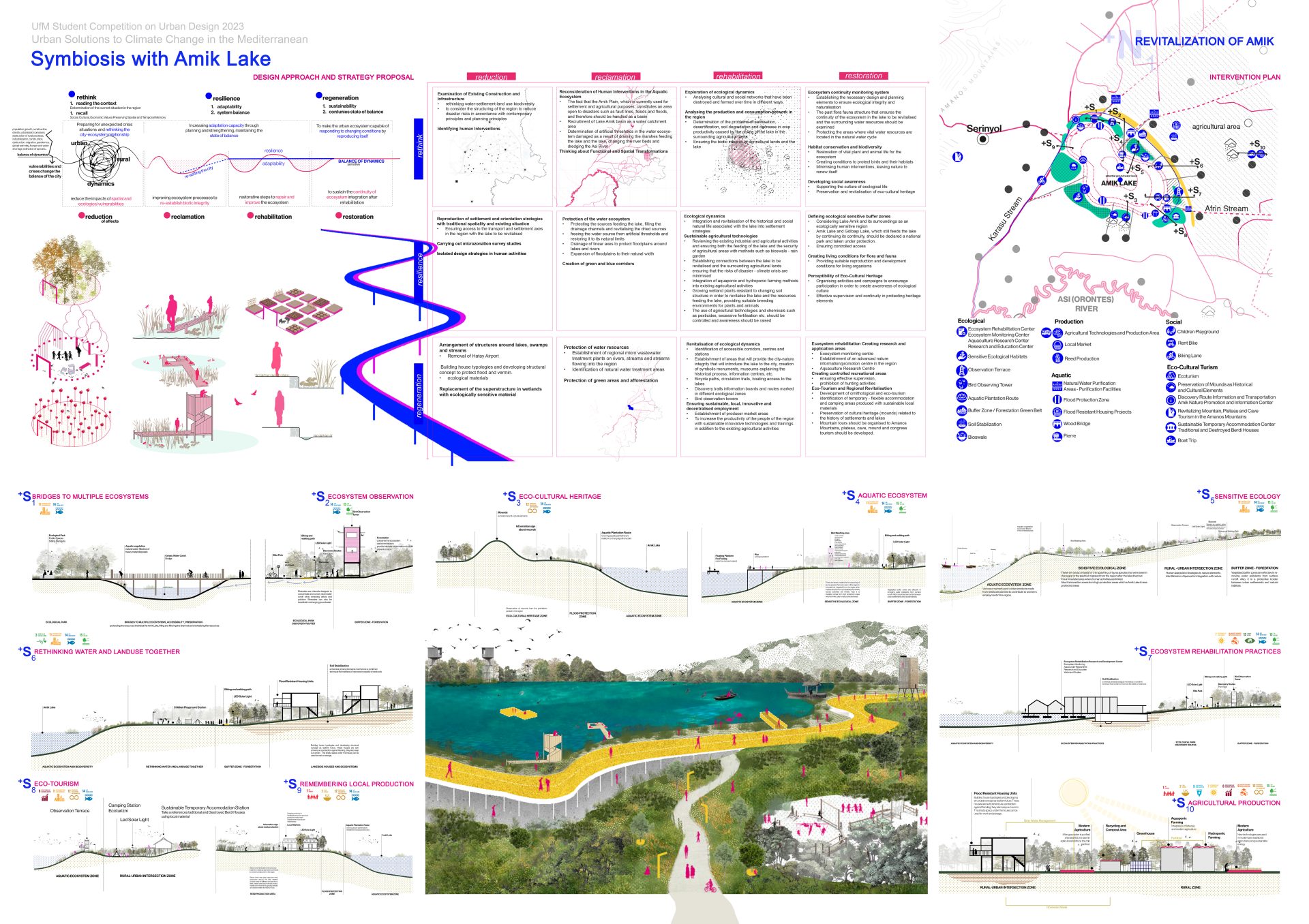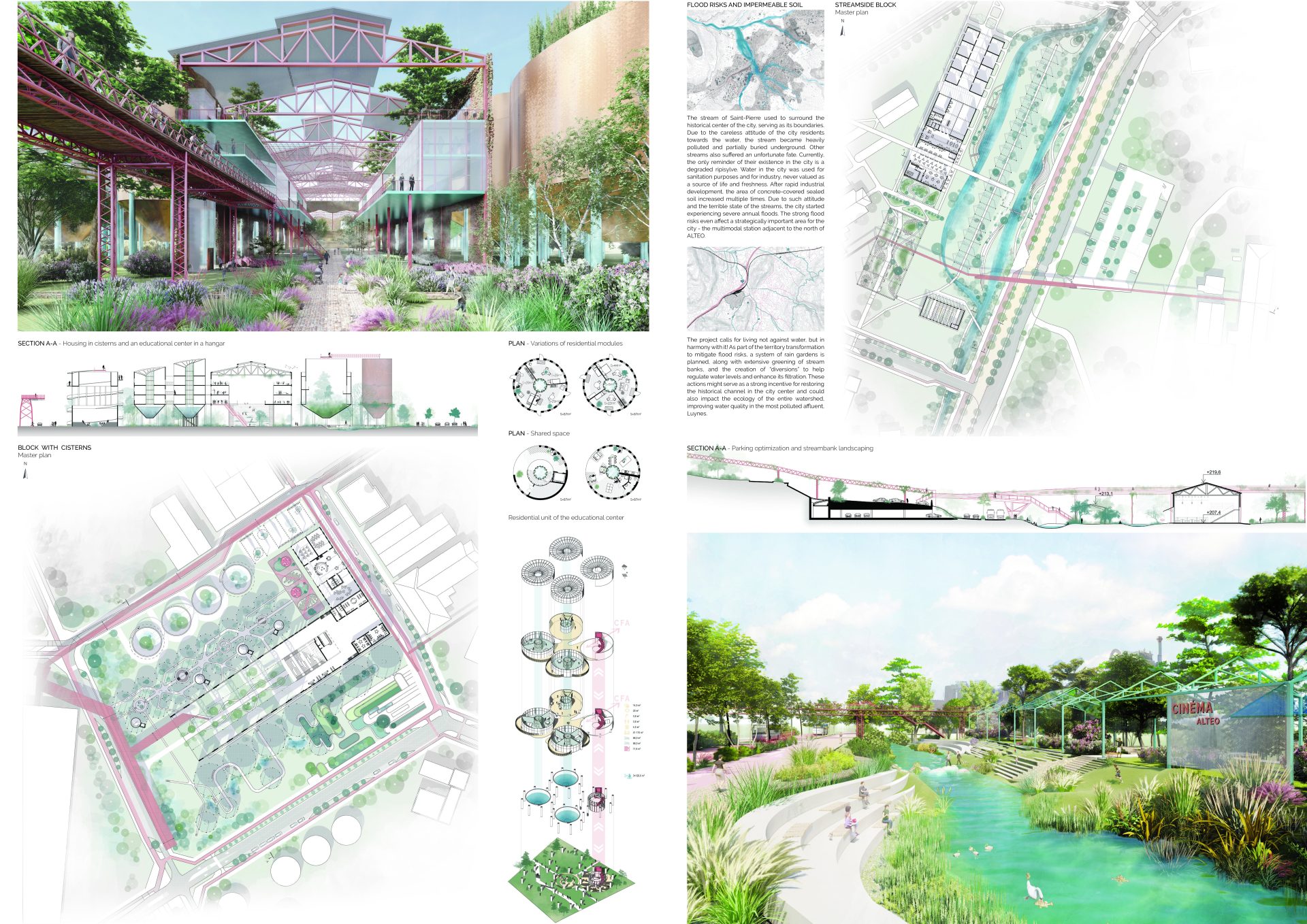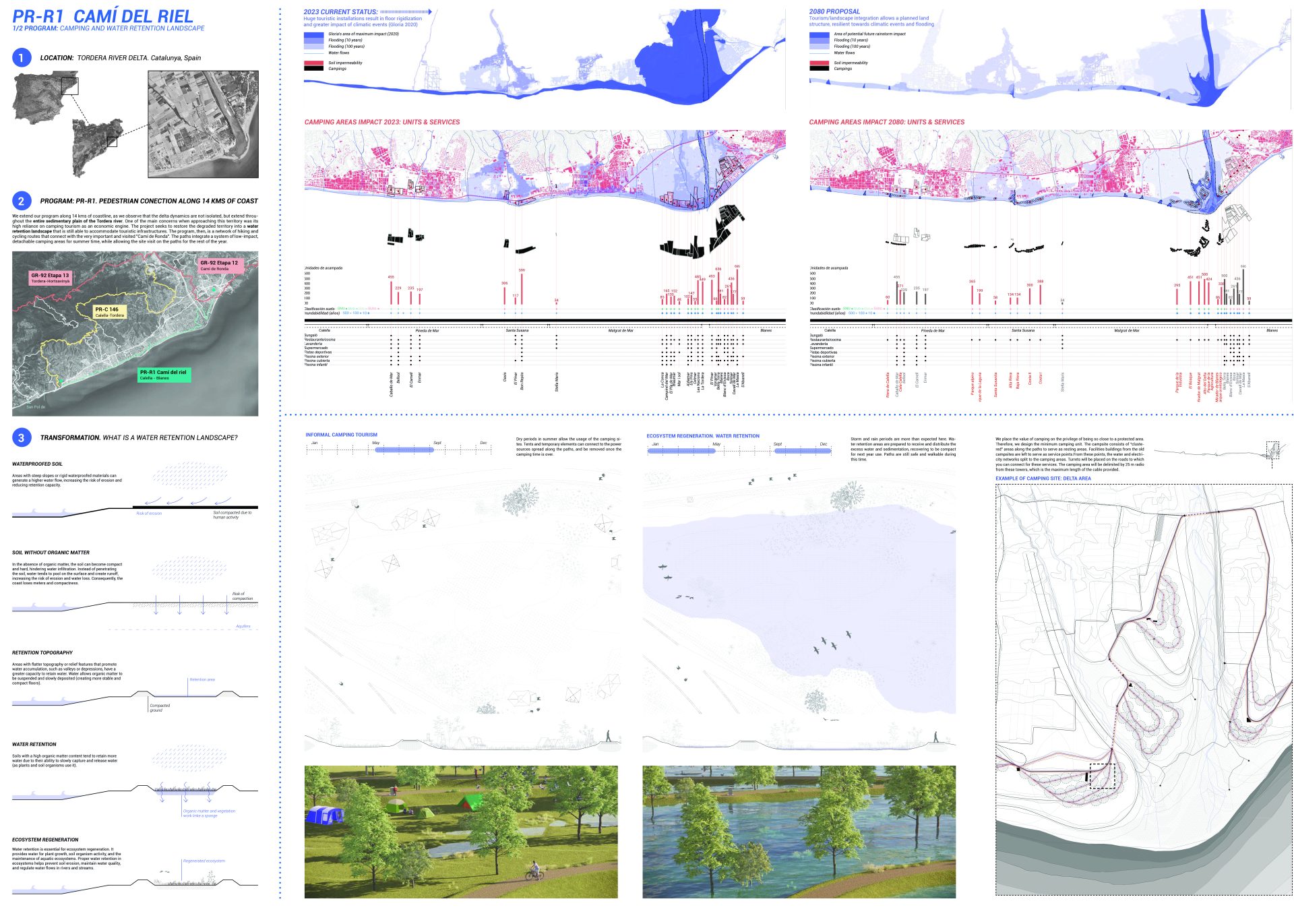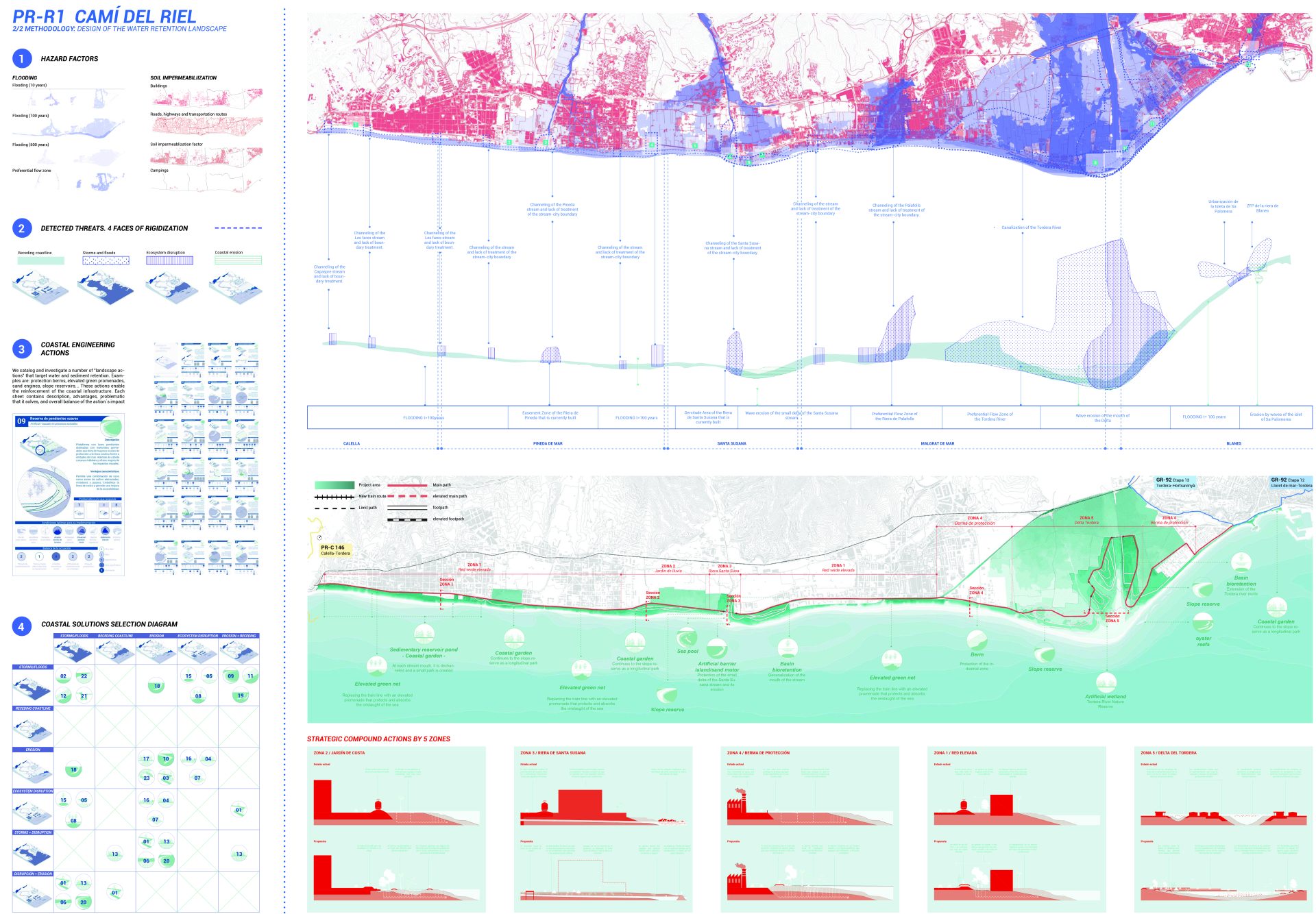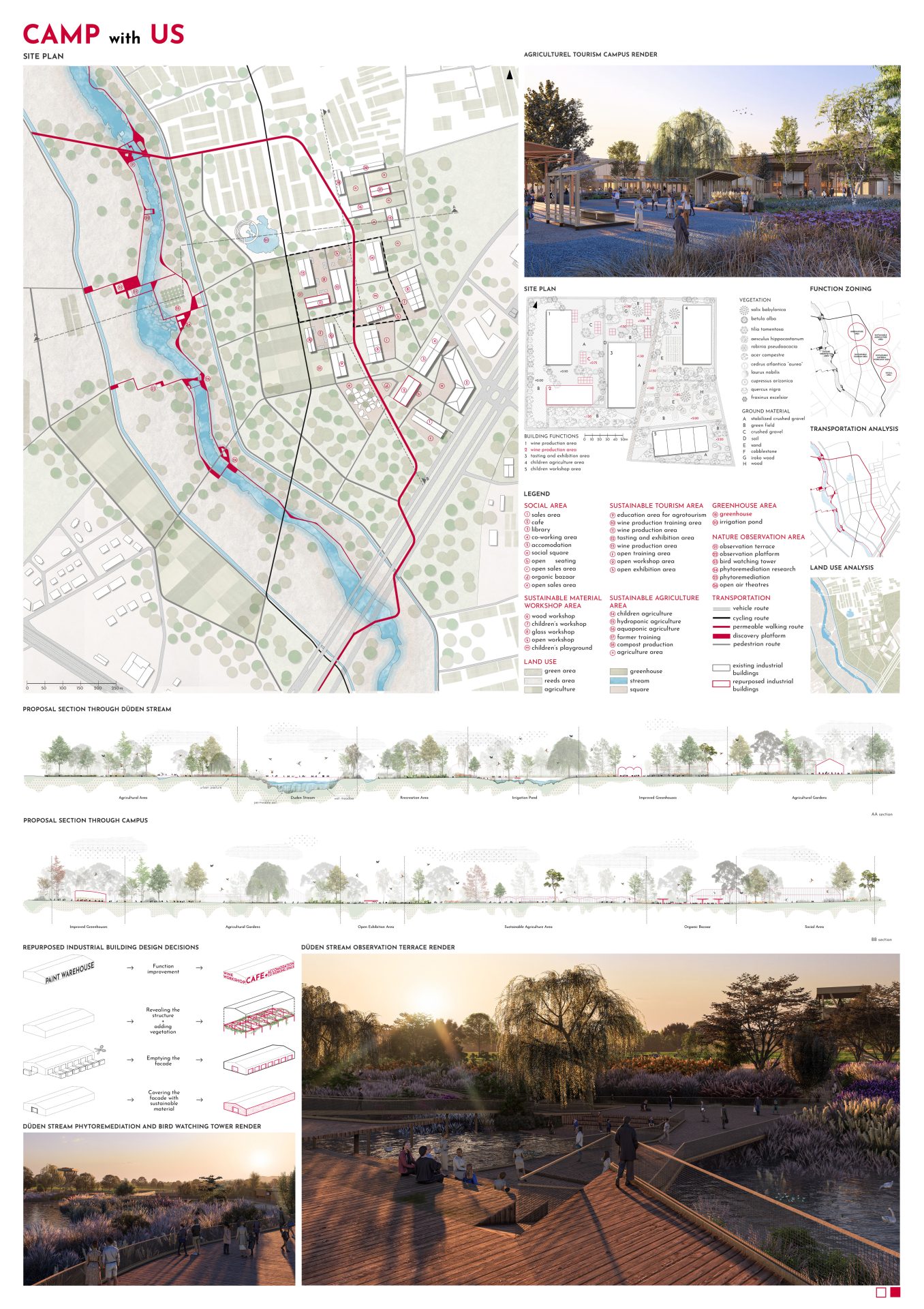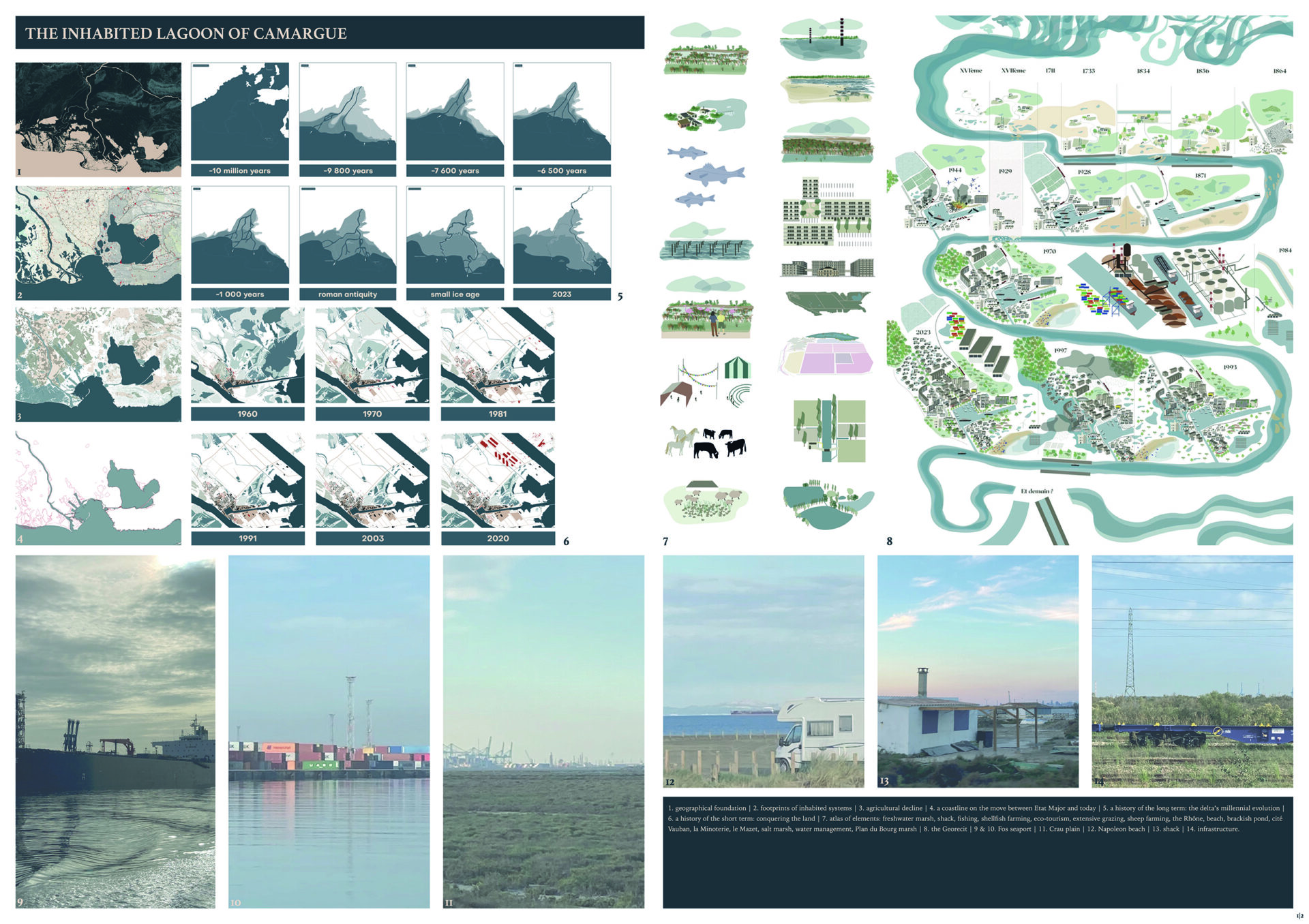Winners of the UfM Student Competition on Urban Design 2023
Barcelona, 31 October 2023. We are pleased to announce the winners of the “UfM Student Competition on Urban Design 2023: Urban Solutions to Climate Change in the Mediterranean”, which has been conceptualized under the UfM Network of Schools of Architecture and Urban Design, to contribute in the international recognition of the youth working on concrete projects in environmental and climate action through urban design.
After reviewing around 80 submitted proposals from 12 UfM countries and from 37 different universities, the jury announced the winners of the “UfM Student Competition on Urban Design 2023” First, Second and Third Prizes, as well as the two winning Mentions.
2023 marked the 15th Anniversary of the Union for the Mediterranean. The Award Ceremony was part of the celebration of this anniversary and framed under the celebrations of the Day of the Mediterranean, which aims to create a momentum for intercultural exchanges and diversity, and to give visibility to positive cooperation stories in the region.
UfM Deputy Secretary General for Transport and Urban Development, Sabri Ergen, thanks the Jury and warmly congratulates “the winners for their excellent projects which address, through innovative and sustainable urban design, the challenges posed by climate change effects in Mediterranean cities and their built environment”. He recalls that “Mediterranean cities, which are among the worst hit by climate change, will have to be planned and designed to face the related challenges such as sea-level rise, water scarcity, and urban heat-island effects” and stresses that “this must and will include ad hoc innovative solutions envisioned by the region’s youth”.
The Jury praised the high quality of the project entries, which made the selection process both challenging and exciting. The Jury looks forward to evaluating the lessons learned from this first edition of the award and build on them to make the next iterations even better.
Results of the UfM Student Competition on Urban Design 2023
1st Prize (5000 € awarded by the UfM)
Title – Symbiosis with Amik Lake
Project Team – Eda Akarsu, Beril Özelçi, Özge Keskin
University – Özyeğin University
Country – Türkiye
2nd Prize (3000 € awarded by the UfM)
Title – ALTEO. Transformation of the Post-Industrial Area of Alteo into a Sustainable Development Park
Project Team – Viktoryia Baravikova
University – ENSA Marseille
Country – France
3rd Prize (2000 € Özyeğin University Award)
Title – PR-R1 Camí del Riel
Project Team – Elena del Cura Berzal, Clara Domínguez Gallardo
University – Universitat Politècnica de Catalunya (UPC)
Country – Spain
Mention (500 € awarded by the UfM)
Title – Camp with Us
Project Team – Övgü Resmiye Gülaçar, Zeynep Ece Katipoğlu, Ahmet Hakan Uğur, Kaan Kağızman, Gizem Baydı
University – Yıldız Technical University, Gebze Technical University and Istanbul Technical University
Country – Türkiye
Mention (500 € awarded by the UfM)
Title – The inhabited lagoon of Camargue
Project Team – Liam McCorley, Mathieu Burger
University – ENSA Marseille
Country – France
1st Prize
Symbiosis with Amik Lake
The Mediterranean… Turkey… Hatay… Antakya… A lake, Amik, which was drained with state co-operation for agriculture… Birds forced to change their migration routes… The destruction of a rich ecosystem… An airport built on the Amik Basin…. Houses flooded repeatedly every year, roads rendered unusable… and an airport runway that split in two when the calendars showed 6 February… A city and dozens of villages connected to the city where aid could not reach… Flooded agricultural lands… Thousands of people who perished… “Symbiosis with Amik Lake” focuses on the basin of Lake Amik, which started to be drained in the 1950s. The aim of the project is to present a symbiotic alternative for the existing/to-be existing water in the lake basin and the existing life in the basin through the question “is coexistence possible?”. In this alternative approach, two living organisms (Lake Amik and existing settlements) mutually develop and enrich themselves through three key methods: “rethink” to by reading the context and identifying values that preserve spatial and temporal memory, “resilience” to enhance adaptive capacity and maintain balance, and “regeneration” for responsiveness to changing conditions. This symbiotic proposal directly contributes to sustainable development goals and addresses the climate crisis.
2nd Prize
ALTEO. Transformation of the Post-Industrial Area of Alteo into a Sustainable Development Park
The Arc watershed is a Mediterranean bio-region with the eponymous river that runs through the Bouches-du-Rhône department. Originating in the Var region, it flows into the lagoon of Etang de Berre. The water quality deteriorates significantly in the Pays d’Aix region, where the Luynes River stands out as the most polluted affluent of the Arc. Gardanne, upstream from Luynes, bears a rich industrial, active, and historical legacy. For both the bio-region and Gardanne, flood risks pose a major challenge. The project aims to mitigate these risks and improve the water quality of the Luynes. It relocates the polluting production of the ALTEO factory, located on the edge of the interchange hub, restores permeability to its territory, and transforms it into a sustainable post-industrial park, combining residential, productive, and recreational functions. The park addresses current and future water management challenges by offering a flexible, nature-based solution for handling water loads, cloudbursts, and floods in urban areas. The reintegration of ALTEO enhances the connectivity of Gardanne (historical center, interchange hub, and the new multifunctional district of Pôle Yvon Morandat), while also catalyzing the restoration of the urban water network.
3rd Prize
PR-R1 CAMÍ DEL RIEL
Camping tourism is one of the most respectful in terms of impact. However,the Mediterranean model of the Costa Dorada has grown increasingly insensitive to the water and sedimentary flows that structure the coastline. The project focuses on the overbuilt camping sites of the sedimentary plain and delta of the Tordera River, a vulnerable surface to the action of the sea, storms and river water discharges. Our goal is to restore the degraded territory of its coastline into a water retention landscape that is still able to host the economic engine of informal tourism. A network of routes and accesses to the territory is proposed to ensure the regeneration of ecosystems. How? The paths redesign the topography of the terrain to accommodate a number of selected “landscape actions” that target water and sediment retention. These actions design a resilient coastal support that works along with climatic phenomena. The result is an all-year-round enjoyable, regenerative landscape: low-impact walkable routes are equipped with integrated, detachable camping sites. The project, in conclusion, seeks to find a new definition of tourism that does not involve the exploitation of the landscape, but its protection and revaluation through resilient and durable infrastructures.
Mention
CAMP WITH US
In recent years, Turkey has faced escalating climate change challenges, such as floods, excessive rainfall, drought, and heatwaves, with Antalya, a populous coastal city, being particularly vulnerable to these impacts. Antalya’s city center is intricately connected to various rivers, notably Düden Stream, historically vital for both Antalya and surrounding ancient cities. Project revives Düden Stream for climate resilience. Integrates sustainable agriculture and tourism for a symbiotic urban solution. The Düden stream was thought as a sustainable tourism campus and subdivided into six nodes which provides climate resilience. The ‘Camp with Us’ urban design project is at the core of this comprehensive sustainable tourism campus. It offers sustainable tourism and repurposes warehouses for accommodation, social spaces, organic farming, markets, and workshops. The project selected this location to mitigate urban heat and promote greenery in an area affected by the urban heat island effect. Camp with Us incorporates existing greenhouses for a visitor farming experience. This sustainable tourism initiative encourages using the entire Düden stream route for education on sustainability and climate change. Additionally, the project benefits local farmers. Camp with Us promotes sustainable interaction between locals and tourists, enhancing the city’s climate resilience.
Mention
The inhabited lagoon of Camargue
We built our diploma project with a profound desire to question our future practice as architects. This diploma year was a quest for meaning, a manifest moment we used to do a critical retrospective of our five years at school but also to position ourselves as young architects. We seized this opportunity to affirm our convictions and ideals that drive us to pursue this career. This project relies on an in depth research about perceptions and knowledge of territories, as well as project making and communicating tools. In Camargue, one of France’s most vulnerable climate change hotspots, we offer a unique way to reinhabit a constantly evolving delta. We try to distance ourselves from a masterplan vision by showcasing an exhaustive systemic approach of the territory that allows us to create precise and targeted project proposals. These multiple projects of different natures have various sizes and temporalities but all interact together at different levels. Our diverse architectural responses all work in synergy towards the creation of a new territorial ecosystem capable of thriving with climate change. Our goal is to promote a new diplomacy between human life and Camargue’s ecosystem to safeguard our common future.
This diploma project took place in the framework of the Erasmus + KA220 project MELIMED coordinated by ENSA-Marseille.
The Union for the Mediterranean (UfM) is an intergovernmental organisation, which brings together with 43 members, including all countries of the European Union and 16 non-EU countries around the Mediterranean. The UfM provides a forum to enhance regional cooperation and dialogue, as well as the implementation of concrete projects and initiatives with tangible impact on the citizens of its Member States.





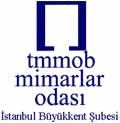

Share this

